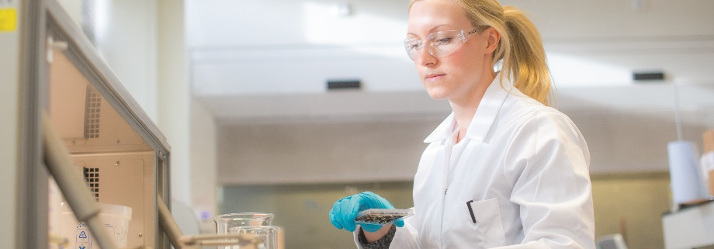
Green Chemicals is one of our six Beacons of Excellence — transdisciplinary areas of world-leading research excellence that address global challenges.
Our Beacons of Excellence were unveiled at the Royal Society in London at the launch of the University of Nottingham’s Research Vision, a landmark investment of more than £200m in our people and our research.
Our ambition is for our University to be recognised as amongst the very best in the world. Our Beacons of Excellence are at the core of this global vision.
The beacons will drive significant inward investment into our internationally renowned research areas, and support our ambitious vision by increasing collaboration, strengthening networks and partnerships, attracting diverse funding, and raising the reputation of our world-changing research.
Each beacon addresses key global challenges and collectively they address all 17 of the United Nations’ Sustainable Development Goals.
Following introductions to Propulsion Futures, Rights Lab, Precision Imaging, and Future Food, the spotlight now falls on Green Chemicals.
This beacon addresses the challenge of securing the low carbon bio-economy of the future.
Today, many products are manufactured from fossil reserves using energy-intensive technologies.
We are spearheading the transformation of energy-intensive economies into low-carbon societies; where, in the age of the genome, many products will stem from microbial cell factories. We will pioneer in this multi-disciplinary field, integrating our world-leading expertise in metabolic engineering, process development and sustainable chemistry.
Together with our extraordinary track-record of industrial collaboration, we are creating a cutting-edge biotechnology platform that will unleash economic potential for our collaborators. Facing up to global challenges, our research will have transformational impacts on agriculture, industry and health.
Professor Alex Conradie, Director of Green Chemicals, says this transformation, like the ongoing digital revolution, will turn the world upside down.
He adds: “The products we use every day still rely on energy-intensive petrochemical technologies and fossil reserves. But similar to the invention of the microprocessor, advances in biotechnology have created transformational opportunities in providing cost-effective and more sustainable processes for the chemical industries.”
We will next introduce the remaining Beacon of Excellence, Smart Industrial Systems, while highlighting how our investment is supporting all researchers in the delivery of exceptional discoveries.
Posted on Monday 24th July 2017